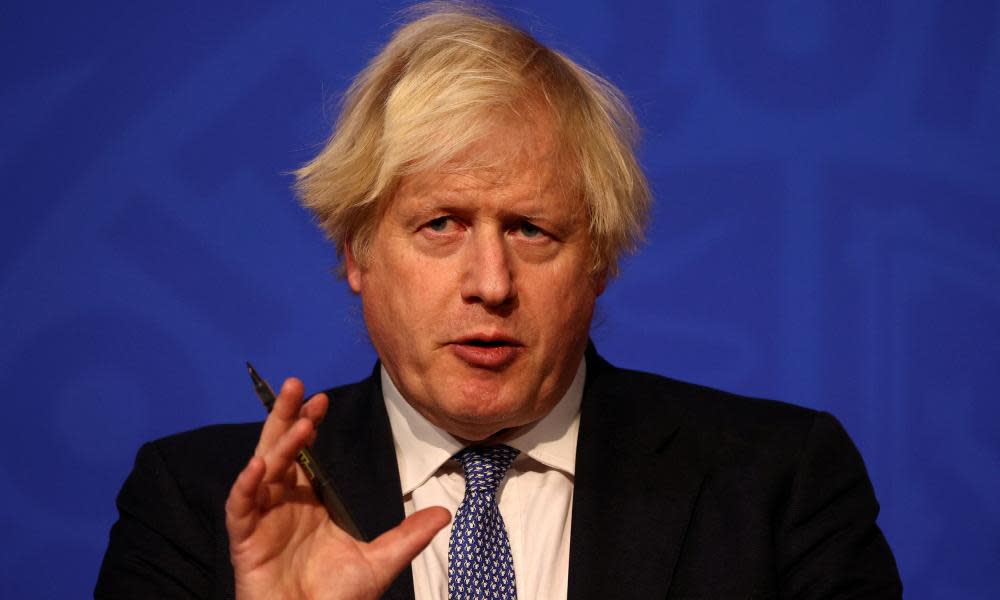Boris Johnson will not be involved in Scottish Tory conference, sources say

The rebellion by Scottish Tories over Boris Johnson’s leadership erupted into open warfare on Thursday after it emerged the prime minister was not expected to speak at the party’s spring conference.
The unprecedented absence, confirmed by several sources, came after Jacob Rees-Mogg was bitterly criticised for attacking the character of the Scottish Tory leader, Douglas Ross, on Wednesday night.
Senior Conservatives in Scotland said the leader of the House of Commons had boosted the Scottish National party and undermined the union after he dismissed Ross as a “lightweight” and serial rebel following his call for the prime minister to quit.
Scottish Tories were furious, accusing Rees-Mogg of being “pathetic” and urged him to “have a long lie down”. Rees-Mogg refused to back down on Thursday, stating: “If you take the king’s shilling you are beholden to the crown.”
Related: Rees-Mogg’s Douglas Ross attack betrays desperation to change narrative
With nearly all 31 Scottish Tory MSPs publicly supporting Ross’s call for Johnson to quit, sources said it was “inconceivable” the prime minister would now appear at the Scottish party conference in March – the first time a UK leader would have been barred from doing so.
The event was still being planned but one source said: “I don’t see a way he could be involved really.” A spokesperson for the Scottish Tories later downplayed the issue, saying: “No discussions have been had about this.”
The Tories’ discomfort over Rees-Mogg’s attacks was exposed when Nicola Sturgeon, the Scottish National party leader and first minister, said his remarks illustrated the Conservatives’ “utter contempt” for Scotland. “If they can’t even show basic respect for their own colleagues, what chance do the rest of us have?”
Sturgeon concluded that independence would have the “added benefit no longer [having] to put up with being treated like something on the sole of Westminster’s shoe and I suspect even Douglas Ross finds that a really attractive proposition”.
Speaking in the House of Commons, Pete Wishart, the SNP’s shadow leader of the house, goaded Rees-Mogg. “The Scottish Tories are supposed to be the Praetorian guard of the precious union, and the leader of the house has just undermined them, thrown them under the proverbial bus,” Wishart said.
“If this is how the government even treats the Scottish Tories, why should the Scottish people entertain being a part of their useless union?”
Ross told reporters Rees-Mogg was entitled to his opinions. “I don’t have to agree with them,” he said. “My message [to him] is I’m going to hold the first minister to account, and ensure the Scottish Conservatives continue to provide that real alternative here in Scotland.”
Alister Jack, the Scottish secretary, distanced himself from Rees-Mogg’s attacks by telling the BBC that all his Scottish Tory colleagues, including Ross, were “held in high regard” at Westminster. But Jack said Ross and his colleagues had “jumped the gun” by calling for Johnson to resign after the prime minister acknowledged attending the No 10 garden party on 20 May 2020, in defiance of a UK-wide ban on gatherings.
Jack implied that an internal inquiry led by Sue Gray, a senior civil servant, which many Tory MPs are waiting for before deciding whether Johnson should stay, would clear the prime minister of breaching the rules. “Then they may reconsider their position,” Jack said. “But let’s wait. They need to see the full facts.”
Scottish Tory leaders often reject UK government policy, pursuing distinctive devolved policies for Holyrood, and there was open disagreement about Brexit strategy after the 2016 EU referendum.
However, despite Rees-Mogg’s attempt to single out Ross, the scale of the Scottish Tory rebellion against Johnson is unprecedented. Jack is the only one of six Scottish Tory MPs and 31 MSPs to openly back the prime minister; three successive Scottish Tory leaders – Ruth Davidson, Jackson Carlaw and Ross – have now called on him to quit.
Jack’s four other Westminster colleagues are thought to share Ross’s anxieties, and some, furious with his leadership and conduct, believe the prime minister is unlikely to survive.
They are waiting to see whether any other scandals about Johnson’s conduct come to light and for Gray to complete her investigation before deciding whether to back calls for him to resign, to avoid fuelling a failed rebellion. Andrew Bowie, the MP for West Aberdeenshire and Kincardine, said: “I do not believe the [prime minister’s] apology was enough. However, I think it’s important to wait and see what the report says.”
An hour before Sturgeon’s attack on Rees-Mogg at Holyrood, the UK government announced a “landmark agreement” setting out how the UK and devolved governments will work together “based upon on the existing values of mutual respect, maintaining trust and positive working”.
This post-Brexit upgrade of the joint ministerial committee set up by the Labour government in 1999 has been spearheaded by Michael Gove. He said it would build on “the incredible amount of collaboration already taking place between the UK government and the devolved administrations”.

 Yahoo News
Yahoo News 
